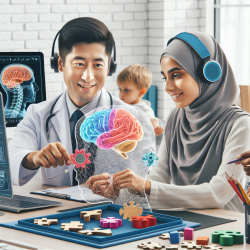As speech-language pathologists, our commitment to data-driven decisions is paramount, especially when dealing with rare genetic disorders like Hunter syndrome (type II mucopolysaccharidosis). A recent case report titled Case report: a rare case of Hunter syndrome (type II mucopolysaccharidosis) in a girl provides valuable insights that can enhance our practice and outcomes for children.
Understanding Hunter Syndrome in Females
Hunter syndrome is a rare X-linked recessive disorder typically affecting males due to mutations in the iduronate 2-sulfatase (IDS) gene. However, the case report presents a unique instance of a female patient, illustrating the complexity of genetic anomalies and their impact on diagnosis and treatment.
Key Findings from the Case Report
- The girl presented with symptoms including growth retardation, joint stiffness, and a distinctive facial phenotype.
- Genetic analysis revealed a hemizygous deletion in the IDS gene, inherited from the mother, and a partial deletion of the long arm of the paternal X chromosome.
- The combination of Turner syndrome and Hunter syndrome was diagnosed, underscoring the importance of comprehensive genetic testing.
Implications for Online Therapy
Online therapy services, such as those provided by TinyEYE, can significantly benefit from integrating these findings. Here are some actionable steps:
1. Comprehensive Genetic Assessments
Incorporate detailed genetic assessments in your initial evaluations. Understanding the genetic background can inform tailored therapy plans, ensuring they address the specific needs of each child.
2. Multidisciplinary Approach
Collaborate with geneticists, pediatricians, and other specialists. A multidisciplinary approach can provide a holistic view of the child's condition, leading to more effective interventions.
3. Personalized Therapy Plans
Use the genetic information to customize therapy plans. For instance, knowing the presence of Turner syndrome alongside Hunter syndrome can guide the selection of therapeutic activities that consider the child’s physical and cognitive capabilities.
4. Continuous Monitoring and Adaptation
Regularly monitor the child's progress and adapt the therapy plan as needed. Genetic disorders can manifest differently over time, and therapy must be flexible to accommodate these changes.
Encouraging Further Research
This case underscores the need for ongoing research into rare genetic disorders. Practitioners should stay informed about the latest findings and consider participating in or initiating research studies. By contributing to the body of knowledge, we can improve diagnostic accuracy and therapeutic outcomes for children with rare conditions.
To read the original research paper, please follow this link: Case report: a rare case of Hunter syndrome (type II mucopolysaccharidosis) in a girl.










